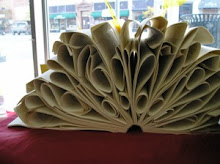
by Shawn Wathen
June 30th 2011 will mark the 100th anniversary of the birth of the Polish Poet Czeslaw Milosz. To say that he was influential in my life is to understate things to an astonishing degree. In the field of world literature, 1911 was an auspicious year. Elizabeth Bishop, Max Frisch, William Golding and Naguib Mahfouz were all born in that year, but Milosz was the brightest star. Outstanding in a variety of forms--belles lettres, essays, autobiography--it was as a poet that he defined himself, and as I first came to read his words.
In 2002, The National Book Foundation, Random House and Ingram Book Company asked booksellers to write about a book that changed your life. This is the essay I wrote.

1989. The Navy, then college, I drifted through life. Idly browsing the university bookstore's shelves one day, my eyes alit on a work by an author whose name, with its odd consonant groupings, appeared unpronounceable.
A poet.
Not being a reader of poetry, it remains a mystery how I had wandered into that section. The pink cover depicted a still life by Chardin; the author photo presented a stern-faced man, a winner of the Nobel Prize for Literature.
Opening it at random, the poem "A Magic Mountain" captivated me. I cannot recall ever reading anything so breathlessly. I was stunned. I stood rooted to that spot, reading poem after poem. I had read books my entire life, but never understood that words could wield such power.
I purchased the book-my first book of poetry-and kept it with me continually. Within a week I had decided to pursue graduate studies in the intellectual history of that poet's native land. What historical conditions could produce such a poet? While studying his native language, I met the woman I love. At our wedding we read "After Paradise," from that same collection. I traveled abroad to further my understanding of this poet and his culture, and met countless wonderful people on my journey--including the poet himself--enriching my life beyond measure.
As a bookseller, I introduce others to the power and beauty of poetry. Poetry matters. Words can change the world. Czeslaw Milosz changed my world with his Collected Poems, 1931-1987.
In April of this year, Robert Gray wrote in ShelfAwareness of being a casual reader of poetry throughout the year, not only during National Poetry Month.
On June 30th, pour yourself a glass of excellent Polish vodka--I recommend Belvedere--read some Milosz, and toast the poet and our great fortune at having his words to nourish our souls.










